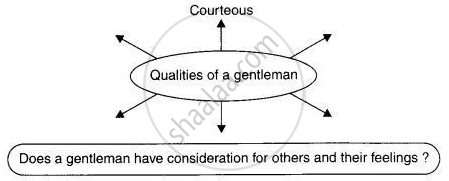Advertisements
Advertisements
Question
Read the given excerpt and answer the questions briefly.
| “Well," I said, "we're leaving on Monday. Is there anything I can do for you before we go?" Nicola shook his head, but suddenly Jacopo said, “Sir," he burst out, "every Sunday we make a visit to the country, to Poleta, 30 kilometres from here. Usually we hire bicycles. But tomorrow, since you are so kind, you might send us in your car." I had already told Luigi he might have the Sunday off. However, I answered, “I'll drive you out myself." There was a pause. Nicola was glaring at his young brother in vexation. "We could not think of troubling you, sir." "It won't be any trouble." |
- Identify the phrase that indicates that the visit to Poleta on Sundays is significant as a routine or tradition. (1)
- What does the narrator's offer to drive the brothers to Poleta reveal about his character? (1)
- Why was there a pause after the narrator’s offer? (1)
- State one reason why Jacopo might have wanted a car ride despite the choice of hired bicycles? (1)
Solution
- Every Sunday
- Kindness/generosity
- Nicola was taken aback by Jacopo's request and needed a moment to process it.
- Nicola was hesitant to accept help from the narrator, possibly due to pride or a desire to be self-sufficient.
- A moment of awkwardness or tension as the brothers considered the offer and the potential implications of accepting it.
- A car ride would be more efficient and less tiring than cycling for 30 kilometres.
- An opportunity to experience something different and more comfortable.
Notes
Students can refer to the provided solutions based on their preferred marks.
APPEARS IN
RELATED QUESTIONS
What are the qualities of a "gentleman"? Work with your partner and complete
the following web-chart by listing the qualities of a gentleman.

Based on your reading of the story answer the following question by ticking the
correct option.
The driver did not approve of the narrator buying fruit from the two boys because
Based on your reading of the story answer the following question by ticking the
correct option.
Nicola was not pleased when Jacopo asked the narrator to drive them to Poleta as he
Based on your reading of the story answer the following question by ticking the
correct option.
The narrator did not go inside Lucia's room as
Based on your reading of the story answer the following question by ticking the
correct option.
The boys were the first to join the resistance movement against the Germans because
What do you understand by the following statement?
"We do many things, sir," Nicola answered seriously. He glanced at us hopefully.
What do you understand by the following statement?
He coloured deeply under his sunburn, then grew pale.
What do you understand by the following statement?
He smiled uncomfortably. "Just plans, sir," he answered in a low voice.
What do you understand by the following statement?
Yet in both these boyish faces there was a seriousness which was far beyond their
years.
Answer the following question briefly.
Why didn't Luigi, the driver, approve of the two boys?
Answer the following question briefly.
Why was the author surprised to see Nicola and Jacopo working as shoeshine
boys?
Answer the following question briefly.
Why were the boys in the deserted square at night? What character traits do they
exhibit?
Answer the following question briefly.
The narrator asks the boys, "Must you work so hard? You both look rather tired."
The boys replied, "We are not complaining, sir." What do you learn about the boys
from their reply?
Two Gentlemen of Verona is written in the first person. A story written in the first person is a first-hand account of events told or narrated through the eyes of a single character, typically the main character. Stories written in the first person are easily identified by the use of the pronoun 'I' rather than 'he or she'.
The reader will see phrases such as "I said, I thought," rather than "he said, she thought." Everything is experienced through the eyes of a single character, and all thoughts and observations are limited to that one person. There can be no outside observer. If the narrator does not see or experience an event first-hand, it cannot be a part of the story. All scenes in the story are filtered through this person's unique perception.
The third-person is a narrative mode in which both the reader and author observe the situation either through the senses and thoughts of more than one character, or through an overarching godlike perspective that sees and knows everything that happens and everything the characters are thinking. In this mode of narration, the narrator can tell the reader things that the main character does not know, or things that none of the characters know.
Rewrite, in third person, any part of story you like
As the narrator, write an article on the lesson of love, faith and trust that you have
learnt from the two young boys of Verona.
After her brothers' visit, Lucia writes a page in her diary about her past life and
her present situation. As Lucia, write the diary entry in about 150 words.
Listen to your teacher reading an excerpt from page no. 189, from the diary of a 13
year old girl Zlata Fillipovic who writes of the horrors of war in Sarajevo in her
book Zlata's Diary.
Based on your listening of the passage, complete the following statements.
1. The first sign of approaching war was …………………………………………….
2. The family went into the cellar when ………………………………………………
3. The 'awful cellar' was the only place that could save their lives because …………………
4. Zlata's friend, Nina died when ………………………………………………….......
5. Zlata and her father were worried about her mother's safety because ......................…
Answer the following question:
What will Shakespeare's friend realize when he rises on the Day of Judgment?
